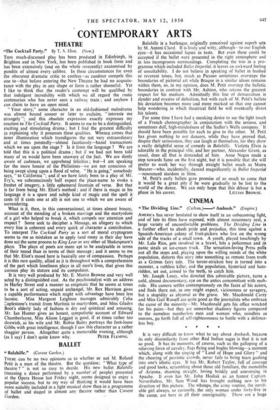CONTEMPORARY ARTS
THEATRE
"The Cocktail Party." By T. S. Eliot (New.) Tins much-discussed play has been produced in Edinbbrgh, in Brighton and in New York, has been published in book form and has been extensively (and on the whole reverently) anatomised by pundits of almost every calibre. In these circumstances for even the obscurest dramatic critic to confess—as candour compels this one to—that before entering the New Theatre he had no acquain- tance with the play in any shape or form is rather shameful. Yet I like to think that the reader's contempt will be qualified by that indulgent incredulity with which we all regard the rustic centenarian who has never seen a railway train ; and anyhow I can claim to have an open mind.
" Your story," some character in an old-fashioned melodrama was almost bound sooner or later to exclaim, " interests me strangely "; and this obsolete expression exactly expresses my reaction to The Cocktail Party. It seems to me to be a distinguished, exciting and stimulating drama ; but I find the greatest difficulty in explaining why it possesses these qualities. Whence_ comes that inner illumination which transfigures the not very extraordinary and at times pointedly—almost facetiously—banal transactions which we see upon the stage ? Is it from the language ? We are told that this is a political drama ; but if we had not been told many of us would have been unaware of the fact. We are dimly aware of cadences, we apprehend felicities ; but—I am speaking for the more honest of the Philistines—we are not conscious of being swept along upon a flood of verse. " He is going," somebody says, " to California ' ; and if we have lately been to a play of Mr. Fry's, we subconsciously half expect the place-name to evoke a freshet of imagery, a little ephemeral fountain of verse. But that is far from being Mr. Eliot's method ; and if there is magic in his language it is a spare and subtle kind of magic and the spell it casts (if it casts one at all) is not one to which we are aware of surrendering.
What is it, then, in this conversational, at times almost breezy, account of the mending of a broken marriage and the martyrdom of a girl who helped to break it, which compels our attention and respect ? Some seek to decipher a Message, an allegory to which every line is coherent and every quirk of character a contribution. To interpret The Cocktail Party as a sort of moral cryptogram seems to me as mistaken' as to apply (and many in their day have done so) the same process to King Lear or any other of Shakespeare's plays. The plays of poets are more- apt to be analysable in terms of their mood than in terms of their message ; and it seems to me that Mr. Eliot's mood here is basically one of compassion. Perhaps it is this rare quality, allied as it is throughout with a comprehension of the part which loneliness plays in all men's lives, that gives this curious play its stature and its compulsion.
It is very well produced by Mr. E. Martin Browne and very well acted by a distinguished cast. As the psychoanalyst with an address in Harley Street and a manner so enigmatic that he seems at times to be a sort of acting, unpaid archangel, Mr. Rex Harrison gives a capable performance which might with advantage have been less laconic. Miss Margaret Leighton manages admirably Celia Coplestone's transit from Martinis to martyrdom, and Miss Gladys Boot's elderly lady of fashion is dry and quizzical and amusing. Mr. Ian Hunter' gives an honest, sympathetic account of Edward Chamberlayne, Miss Alison Leggatt is good, if at times rather too shrewish, as his wife and Mr. Robin Bailey portrays the foot-loose Gibbs with great intelligence, though I saw this character as a rather shaggier person. Altogether quite a memorable evening, although (as I say) I don't quite know why. PETER FLEMING.






































 Previous page
Previous page